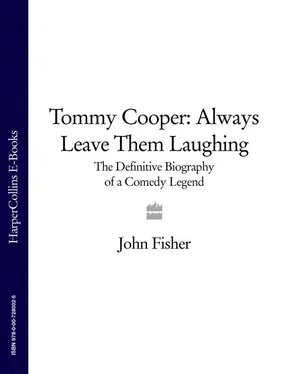Throughout the archival documentation the voices of agents and producers, friends and journalists all have their moment on stage. But essentially it is a record of a professional ménage à trois inhabited by Tommy, Gwen and Miff. The other key person to figure in my own pages is his partner outside of marriage. She is almost entirely absent from Miff’s records – such was his discretion – and her role in Tommy’s life as stage manager, mistress, and handmaiden only fully came to light after his death. Within a short time, Mary Fieldhouse, professionally known in Tommy’s television circles as Mary Kay (the name by which I have always known her), had sadly cashed in on her relationship with a quick tabloid memoir of their affair. Unnecessary hurt was caused to his widow, who lost no time in dismissing the association as little more than the distraction of a one night stand. However, anyone who worked with Cooper from the time of his meeting Mary in 1967 until the end of his life would have to testify to the genuineness of the feelings between them. In this context her memoir in book form assumed a passing dignity and provides an additional insight into the life of the man she loved.
My own volume never loses sight of its initial objective to chart the progress and impact of his immense comedy talent. Within these pages his fans will hopefully find happy reminders of their favourite one-liners and bits of business. I make no apology for chronicling the obvious. The box of hats, the bottle and the glass, the Nazi Kommandant and the British officer together in one costume may be played back in the minds of his devotees on an almost daily basis, and of course are available in various formats for viewing afresh today. However, it is still hard to come to terms with the fact that going on a generation and a half will not have seen him performing in full flow, whether live or on television. Working on the assumption that the printed page will have the last laugh over the mechanized media, I hope this volume succeeds in evoking the magic of an extraordinary entertainer whose skills and vitality might otherwise be lost to some distant future when the video tapes have all disintegrated, the DVDs become corroded. As we shall see his comedy is more timeless than that of any of his contemporaries. There is a new generation or two or three who deserve to discover his lunacy for their own sanity.
This is not to champion nostalgia for nostalgia’s sake, the idealized memory of some blurred mythical past. Tommy had little truck for nostalgia anyhow. Whenever his cronies began to evoke the legend of some distant comic talent from the music halls, he would query if they remembered Fuzzy Knight. ‘He was simply wonderful, he was,’ asserted Cooper. ‘What was that bit of business he did on the trapeze, the bit with the chimpanzee applauding with the banana?’ Before long everyone would be volunteering their recollection of this absurd imaginary act. Not that Tommy didn’t have his heroes, as we shall see. But truly great comedians like Max Miller, Bob Hope, and Tommy Cooper are like colours in the spectrum. Try to imagine a new one. It is impossible to do so. The modern entertainment media appear happier to opt for shallow celebrity in lieu of genuine talent and the life force of the great performer. For these reasons Tommy Cooper must never be toppled from his pedestal in the minds of all those who – as his contemporary, Alfred Marks once remarked – were already laughing at him as they queued to buy tickets at the box office. Sadly Gwen never got to see Jus’ Like That! having died some six months before the play opened. Nor will she get to read this book. But I hope with genuine affection that I have not let her – or Tommy – down.
ONE
Tommy Cooper off stage and on was his own best magic trick, a bumper fun package of tantalizing twists and turns, a cornucopia of paradox and surprise. He was the most loved of entertainers, but never, like so many in his profession, asked his audience openly for affection. He was the most original of funny men, with hardly an original gambit in his repertoire. He became the most imitated man on the planet, his audience appreciating his individuality all the more. He came to epitomize the world of bumbling ineptitude in both magic and comedy, but with precision and technique to die for. He exploited the comedy of failure and nervousness, but seemingly with utter confidence. He exuded good cheer on stage and off, but was happiest when absorbed in his own private world of sleight of hand and illusion. He was a child in the body of a giant, an amateur with the sparkle of the professional, a heavyweight with the light-footedness of Fred Astaire. His catchphrase could as easily have been ‘riddle-me-ree’: you never knew who was fooling whom as he plied his trade of the tricks, his penchant for practical jokes. The one certainty was his success at so doing. Paradoxically again, no one ever felt let down by the process.
The one aspect of the man that was above question was his physical identity. No British comedian since Charlie Chaplin has displayed a surer grasp of the need for distinctive personal branding on the road to achieving personal immortality, the process that helps to keep him in the forefront of our shared comic consciousness over twenty years after his death when other funny men and women of his era have begun to recede into oblivion. Remove the fez and smooth down the tufts of jet black hair that were trained to sprout like a pair of upturned inverted commas from beneath its brim and you might as well start packaging Coca-Cola in blue cans. On one occasion the great Eric Morecambe – incidentally Tommy’s greatest fan – suggested to the author that he would be better off losing the headgear. He perceived it as a barrier between the performer and the audience. I did not have the temerity to suggest to Eric that he should replace his horn rims with contact lenses.
What he would have done in life had he not found his niche in show business is the great unanswerable question. Mary Kay concedes that he was fully aware of his physical idiosyncrasies, every detail of his gauche six feet three and a half inch, shoe-size-thirteen frame being put into the service of comedy. Of course add on the fez and the inches literally stack up. Through the years critics and fellow comics alike have been thrown into crazy competition in attempts to describe him. Clive James conjured up, ‘A mutant begot by a heavyweight boxer in a car crash in Baghdad’; Barry Cryer with one-liner panache contributed ‘like Mount Rushmore on legs’; Ron Moody added ‘he has a profile like the coast of Scandinavia; his chin is like the north face of the Eiger; Easter Island is like a Cooper family reunion.’ Alan Coren evoked fond cinematic memories of King Kong, remembering ‘the time when it roamed free, this strange, shambling creation unconfined by any human limitation, magnificent in its anarchy, going through its weird, hilarious routines. And none of its tricks worked, and all its half-heard mumbled patter meant nothing at all, and occasionally it would erupt in bizarre, private laughter.’ Nancy Banks-Smith incorrigibly pronounced that ‘he has the huge dignity and innocence of some large London statue with a pigeon sitting impudently on its head and a workman scrubbing him in impertinent places with a stiff bristled brush.’ For me he has always epitomized in spirit as much as in form the abominable snowman as fathered by Santa Claus, or maybe vice versa, with a touch of Desperate Dan – without the stubble on his chin – thrown in for good measure. Whichever you opt for, they all say he was born funny, he looked funny, and he had funny bones. Moreover, perhaps he was the Wagner of comedy. Here is Dylan Thomas on the composer: ‘Whatever I can say about him, he is a big man, an overpowering man, a man with a vast personality, a dominant, arrogant, gestureful man forever in passion and turmoil over the turbulent, passionate universe.’ The only word that confirms he was not writing about his fellow Welsh wizard is ‘arrogant’. Tommy was never that.
Читать дальше












